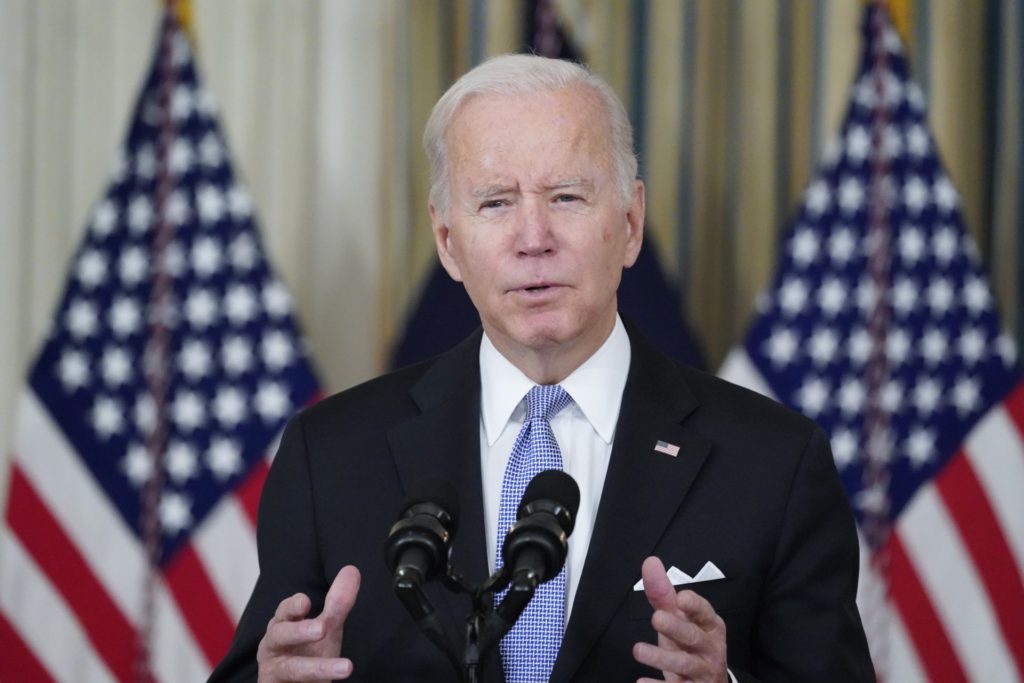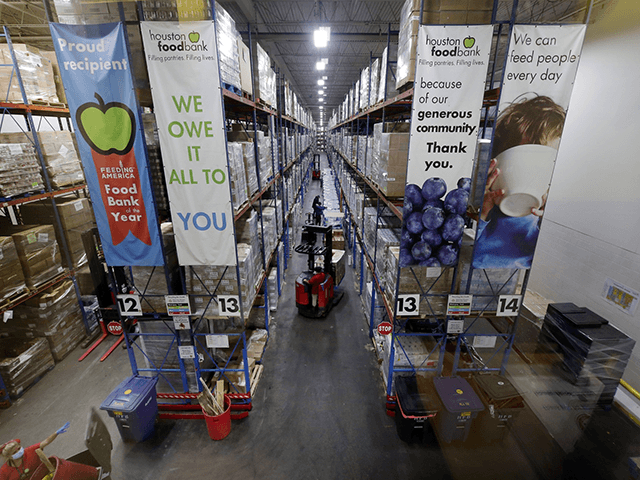President Joe Biden’s soaring food costs are impacting the hungry at local food banks across the nation.
Food banks, which run off the generosity of American workers in local communities, are having difficulty feeding the hungry due to increased food prices since Biden became president and took over the levers of the supply chain. Breitbart News reported Tuesday that food costs increased almost one percent last month and 5.3 percent in the last year.
The rising food costs have exacerbated local pantries’ ability to feed hungry Americans who rely on private charity to eat. For instance, an organization that helps support local food banks, Feeding America, said their partners are distributing 31 percent more food to the hungry in 2021 than in 2020.

President Joe Biden speaks about the bipartisan infrastructure bill in the State Dining Room of the White House, on Nov. 6, 2021, in Washington. (AP Photo/Alex Brandon)
A food bank in Oakland told the Associated Press the cost of basic canned foods has drastically increased. Canned green beans and peaches are more costly by 9 percent, canned tuna and frozen tilapia by 9 percent, frozen chickens by 13 percent, and dry oatmeal by 17 percent.
“And a lot of people are just saying they can’t afford food,” Jason Bautista of Shiloh Mercy House in Oakland said. “I mean they have the money to buy certain things, but it’s just not stretching.”
Food bank CEO Erin Pulling in Colorado told CBS4 her organization is spending 15 percent more on eggs, 30 percent more on canned foods, and 35 percent more on beef. “Our challenge is it is costing us more money than we imagined and more money than we ever spent on food before,” she said.
Pilsen Food Pantry in Chicago has to sometimes close the bank’s doors early because Biden’s supply chain crisis cannot keep up with increasing demand from the hungry. “That might mean closing the doors one day early,” said manager Steve Wiley about the supply chain crisis. “Cooking oil is really expensive right now and there are definite supply chain issues with that so I believe I have nine cases of oil coming tomorrow it might just not show up. And there’s nothing anybody can do about it.”
In Fort Wayne, Indiana, Linda Hansen, the food bank director at Wellspring Interfaith Social Services told 15 CBS it takes three or four months to receive a shipment of food.
“A lot of places that we order food from are saying that it’s three to four months out before we can even get it,” Walker explained. “We then have to depend on volunteers and donations to come in to help fill in that gap… if we continue the process that we’re in, it’s going to be a detriment to to everyone, not having enough truck drivers to get the product.”
Michael Altfest of Alameda County Community Food Bank in Oakland, California, told Spectrum News that Biden’s supply chain crisis hurt the hungry, noting help is not expected “for a while.”
“Things are not getting any easier here for low- and moderate-income households, and we don’t expect it to for a while,” Altfest said.
Follow Wendell Husebø on Twitter @WendellHusebø

COMMENTS
Please let us know if you're having issues with commenting.